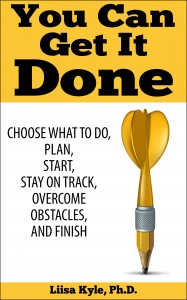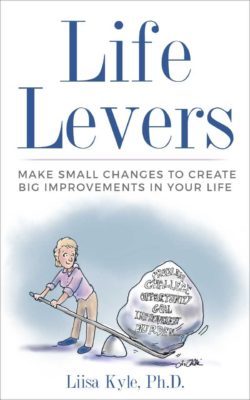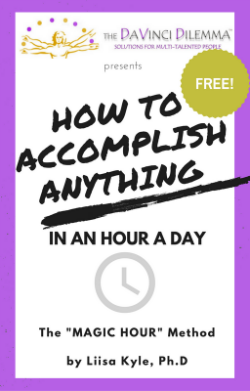By Kaushik.chug [CC BY-SA 3.0 (https://creativecommons.org/licenses/by-sa/3.0)], from Wikimedia Commons
Perhaps you’ve found that taking short breaks throughout the day improves your focus and reduces your stress. Maybe you’ve discovered the mental and physical benefits of daily meditation. Perhaps you’ve found that, if you don’t get to the gym in the morning, you won’t exercise all day. Maybe you’ve found a way to motivate yourself using quotas or The Unschedule.
Now ask yourself: How many of these things have you done today? This week? This month?
One of the great ironies of being a human being is that we find things that work for us — practices or habits that make us happy or healthy or productive — and then we don’t do them.
We start off great guns, say, drinking an extra glass of water before each meal. We find that we feel better. We snack less. Our skin looks better. We commit to making this a regular daily practice. And for a time we do. Then, a couple of months later, we feel parched and cranky and we realize it’s been weeks since we’ve done this very simple thing that we know works for us.
It doesn’t really matter why we do this to ourselves, so long as we implement some tools to short-circuit this tendency. It can be as quick and easy as making a list of what works well for us, keeping it handy and reviewing this list on a regular basis — daily, weekly and/or monthly — whatever schedule is effective for you.
Bonus points if you reward yourself for doing the things on your list. Why not? You’ve earned it. Plus it’ll reinforce the likelihood you’ll keep doing what works well for you, going forward.
Similarly, it’s helpful to remind ourselves about what we know from experience does NOT work for us. Perhaps you’ve noticed that whenever you succumb to the siren calls of social media first thing in the morning, you tend to get hijacked by distractions…whereas if you defer email, Twitter and Facebook until later in the day, you get a solid block of productive work done. Maybe you know that you’re apt to snack excessively when under stress…which doesn’t do anything other than make you cross with yourself.
It’s not rocket science, but it works: if you list those things you want to avoid doing, review these items regularly, and hold yourself accountable, you’ll be more effective, more productive and more content.
There’s also a benefit to reminding yourself of your own personal quirks and patterns — especially when it comes to creative projects. For example, among us there are ‘plodders’ and there are ‘bursters’. Plodders chip away at projects methodically, at a reasonable pace, generating regular, steady output. They work well with quotas — aiming to get so many things done per day or per week. Bursters, on the other hand, tend to need a dormant ‘percolation period’ (which is really more of a teeth gnashing, popcorn munching, garment rending frenzy of seemingly non-relevant activities) before finally (usually at the last moment), generating an extraordinary amount of work, boom boom boom, in short order. Bursters thrive on adrenaline and riding those creative roller coasters. A ‘plodder’ is might a blog post every day, five days a week. A burster might also write five blog posts during the same week…but they’ll spend four days doing god knows what and then boom! create and publish all five on Friday.
(Note that you are not wed to either category exclusively. You may be a plodder in some activities and a burster in others).
The point of this is that once you are aware of how you tend to operate, you can schedule things accordingly. You can do what works well for you without stress or guilt or shame. “Yes, I’m a burster and that’s okay. It’s fine if ‘my process’ means I need to do random activities for a bit. There’s no need to freak out about that. I know whatever needs to get done will get done by deadline.”
Here’s an opportunity to play anthropologist with yourself as a subject: Observe yourself over a week or a month and take notes on what you notice. What are your unique behavioral patterns as you go through different activities in your life. Go beyond the plodder/burster tendency: When do you have the most energy? Under what circumstances are you happiest and most productive? What makes things easier for you? What can you simply not avoid doing? What causes you undue stress?
Why bother? The better you know yourself, the easier it is to be happy, healthy and productive. Know what works well for you and what doesn’t. Remind yourself of these items regularly. Hold yourself accountable. Find ways to do more of what you love, in ways that are gratifying — and to avoid those patterns that are unhealthy, unhelpful or unpleasant.
***
Activity: Jot down your typical patterns of behavior when working on a creative project. What is your typical approach? What challenges do you have to overcome repeatedly? Are you a plodder or a burster?
Activity: Make a list of what works well for you. What increases your contentment, productivity and well-being?
Activity: Make a list of what you know does NOT work well for you. What’s unhealthy or unhelpful? What causes undue stress, distractions, squandered energy or opportunities?
Activity: Make an appointment to review your lists regularly on a suitable schedule — daily, weekly, monthly or quarterly.
***
 Want more tips and techniques on getting things done? Check out my book YOU CAN GET IT DONE: Choose What to do, Plan, Start, Stay on Track, Overcome Obstacles, and Finish
Want more tips and techniques on getting things done? Check out my book YOU CAN GET IT DONE: Choose What to do, Plan, Start, Stay on Track, Overcome Obstacles, and Finish
Available here for only $3.99: http://bit.ly/YouCanGetItDone
***
Want to re-publish this article? Go for it – just include the author’s name, a link to this post and the following text blurb:
Are you struggling with too many talents, skills, ideas? You may have The DaVinci Dilemma™! Find tools, fun quizzes, coaching, inspiration and solutions for multi-talented people at http://www.davincidilemma.com/ .



